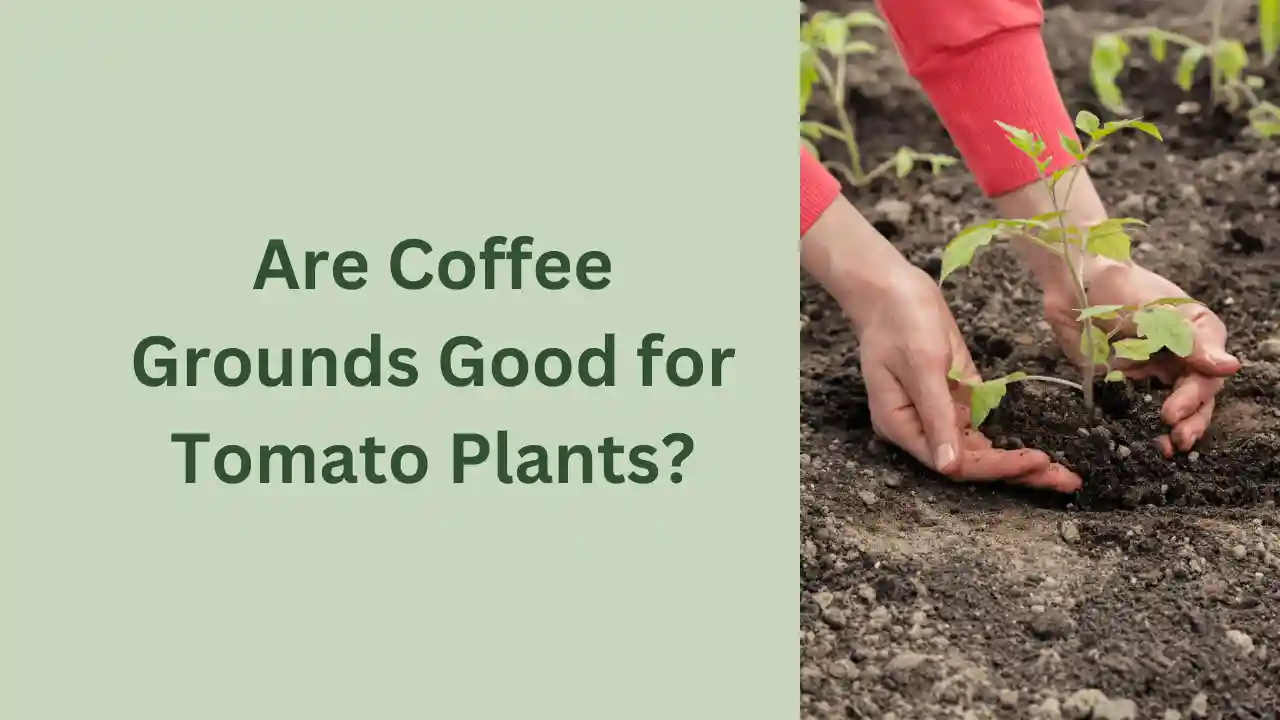It is a famous controversial topic whether coffee grounds are good for tomato plants. Can it serve the purpose of resolving various problems while planting and growing tomato plants?
It is claimed to deal with pests and diseases and can be used as compost, mulch, and many more. But has it been proven by science?
In short, adding a few coffee grounds to the soil below your tomato plants is an excellent way of providing essential nutrients for growth and flourishing. These grounds contain roughly 2% nitrogen, along with varying levels of phosphorus and potassium – all three being vital elements that tomatoes require in order to reach their full potential!
Many gardening myths have existed for years. Some of the myths are about the use of Epsom Salt, eggshells, and coffee grounds. Fortunately, some of the claims work best, while others are a myth.
In this article, I have discussed whether coffee grounds effectively resolve the tomato plantation issue or if it’s just a myth. So let’s jump into it!
Fact or Myth: Do Tomatoes Like Coffee Grounds?
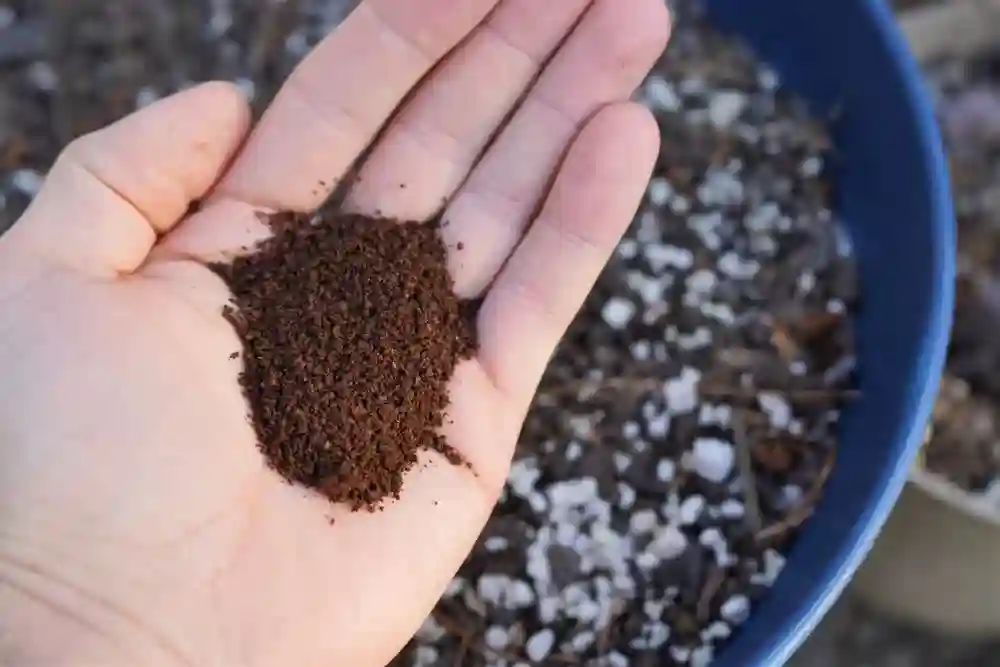
In short, it can be said both yes and no. It is known to all that everything loves to be in a limited amount. Imagine if you are using too much fertilizer for your plant.
Obviously, it would create many issues for the plant. Thus, instead of benefiting the plant, it would put the plant into trouble.
The same rule applies to the application of coffee grounds too. You should use it in proper quantity only to benefit the plant by improving the soil quality and providing the best growing environment.
Increase nutrients:
Coffee grounds are rich in nutrients like nitrogen, phosphorus, and potassium and micronutrients like calcium, copper, iron, magnesium, zinc, and boron.
Using it carefully for your tomato plants can add nutrients and contribute to healthy growth and development.
Slow release of nitrogen:
The microbes present in the soil break the protein in the coffee grounds, and nitrogen is slowly released for the plants.
Favorable pH:
Tomato is acid loving plants and prefer to grow in acidic soil, and the coffee grounds have an average of 6.5 pH which helps to acidify the soil and makes it favorable for the tomatoes.
Compostable:
You can prepare an organic compost pile with 20% of coffee grounds, which is safe to use without harming the plant.
Fungal suppression:
Coffee Grounds can suppress some of the common tomato diseases like fusarium wilt, pythium, and sclerotinia with the application of coffee grounds.
Should you use coffee grounds for tomatoes to fertilize tomato plants?
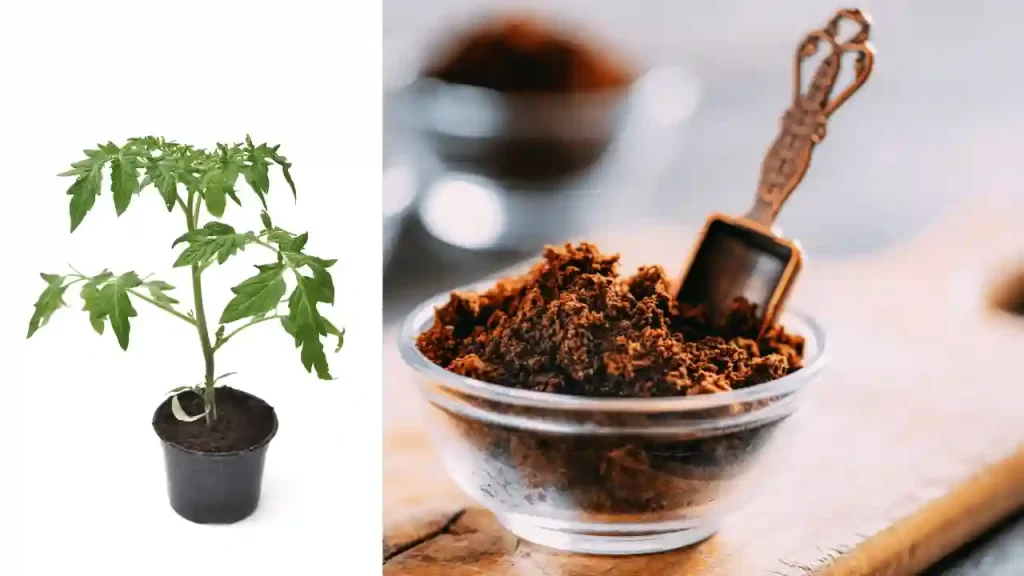
Most of the time, it is advised to use coffee grounds to fertilize your plants either as a nitrogen-rich fertilizer or to revitalize the growth of the tomato plants.
You can say it is overly hiked, yet it has some truth too. The most important nutrients for tomato plants are nitrogen, phosphorus, and potassium, which are needed for the plant’s growth, development, and fruiting. And coffee grounds contain 2% nitrogen and some variable amounts of phosphorus and potassium.
After the decomposition of coffee grounds in the soil, NPK nutrients are released, and the plant benefits.
Theoretically, it is said that mixing coffee grounds in the soil work as a slow-release fertilizer for tomato plants. Instantly no nutrients are provided. It increases the supply of nutrients in the soil after the coffee grounds become soluble slowly and steadily.
If you plan to use coffee grounds as a substitute for your regular fertilizer, then it’s not a great idea. You need to think twice before replacing your regular fertilizer.
Slow-release fertilizers work best with the plants to enhance their growth as they have better nutrients than coffee grounds, which contain only 2%.
It has not been scientifically proven that coffee grounds help grow and develop tomato plants.
Coffee grounds can fulfill the nutrient requirement of tomato plants in a very small amount but in the longer run. This effect is negligible when compared to regular organic fertilizer.
If you want to try it on your plant, you can go for it, but I suggest not applying coffee grounds if your plant is already going through a deficiency of any nutrients or is facing growing problems.
Should you use coffee grounds for tomatoes to acidify soil?
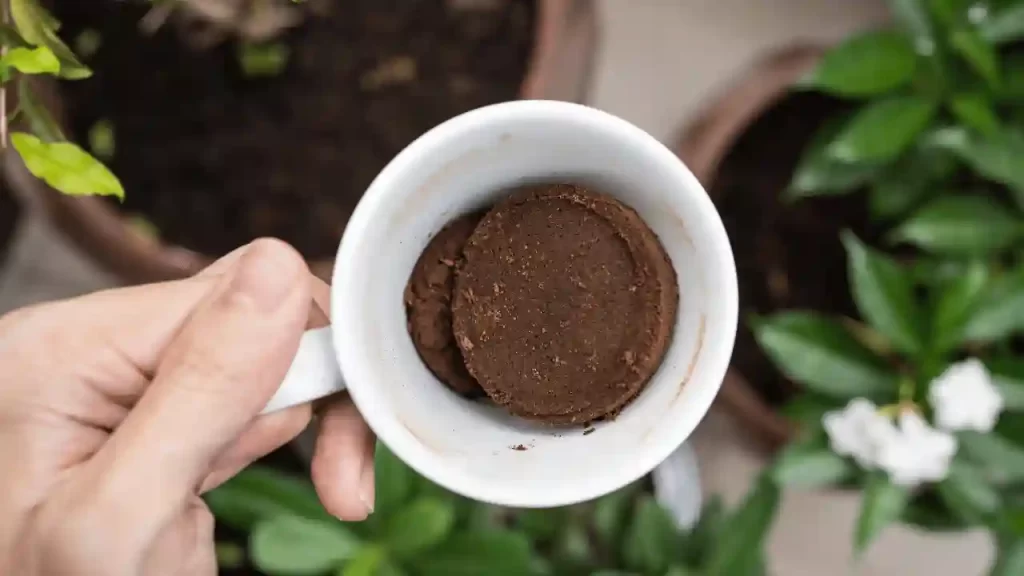
Tomato plants prefer to grow in slightly acidic soil, and coffee grounds are claimed to reduce soil pH. Thus, coffee grounds can favor the growth and health of tomato plants. Though tomatoes grow in acidic soil, coffee grounds cannot work best here.
Most people believe that as the coffee grounds are acidic, it can reduce the soil’s pH level and favor the acidic soil-loving tomato plants. But scientifically, it has not been cleared.
The coffee’s pH fluctuates; on average, its pH is 6.5, which is just neutral. The main concern is that even after being acidic, it is not guaranteed to have a drastic impact on the pH of the soil. It might not give the expected results.
You can find many gardening products in your local nursery store which can lower the soil pH in the desired way. But be specific about reading the product label instructions before its application.
In case of any soil issue, you should first do a soil test to diagnose the issue and take action accordingly.
Because unnecessarily decreasing or increasing the pH of the soil can develop other unsolvable problems for the plants.
Should you use coffee grounds for tomatoes as mulch?
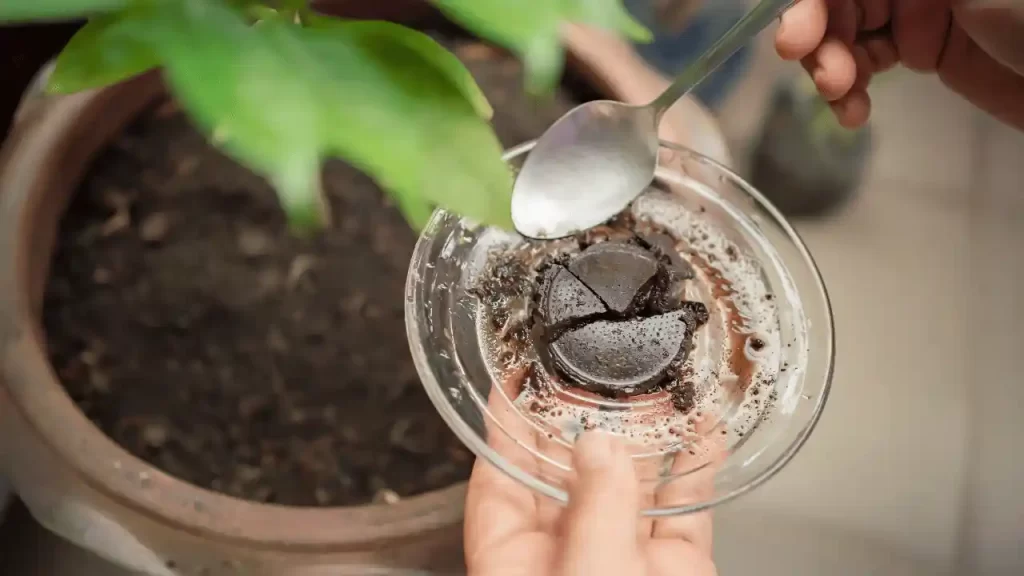
You can find many options to mulch your tomato plants organically. It can be dried leaves, tree bark, grass clippings, straw, etc.; yes, fresh coffee grounds do not fall into these options.
Often, coffee grounds can best work as mulch as they can slowly decompose in the soil and release nutrients. As a result, the quality of the soil is enhanced, and it is also organic. But the truth is that it leaves a negative impact on the plant.
As discussed above, the great way to mulch your tomato plants is by using organic mulch. The ideal thickness of mulch should be 1-2 inches.
When coffee grounds are used as mulch, it forms a hard and thick layer on the soil. Instead of benefiting your plant, it would make the conditions worse by blocking the air to the soil and preventing its moisture. It also prevents oxygen from reaching the roots and disturbs the plant’s entire root system.
Yet there is a way to use these coffee grounds as an effective mulch and enhance soil quality.
20% of the mulch can be coffee grounds. So mix them with your other organic mulch before use.
Avoid using it too heavily, as it can soon compact and block oxygen and water to the soil. And in such a way, you can achieve maximum benefits without any of its side effects.
Should you use coffee grounds for tomatoes to stop weeds?
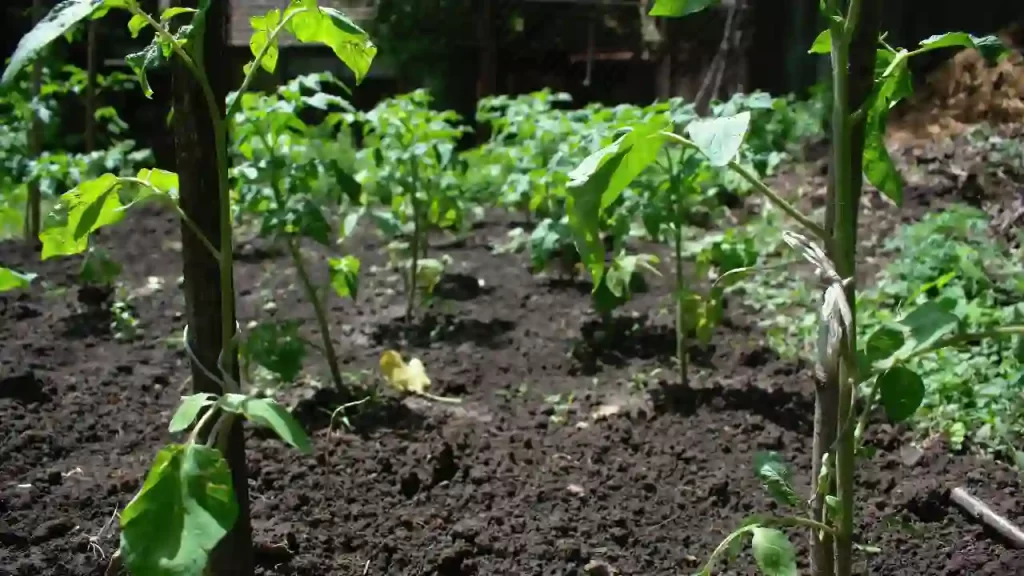
Just like mulch controversy, it is often recommended to use for removing and preventing weeds from your garden. But sadly, its use is not totally effective.
A heavy layer of mulch is effective in treating weeds, but as already discussed, a heavy layer of coffee ground can compact rapidly and block the oxygen and moisture in the soil.
But Some research suggests that it works on a few weeds like clovers and also helps to inhibit the germination of seeds. But yet, its ability to prevent many other weeds is not proven.
The quantity of coffee grounds is also not specified for its safe use to inhibit germination and reduce weeds. Thus I suggest opting for the tried, tested, and proven methods to get rid of weeds.
Should you use coffee grounds for tomatoes to kill slugs?
Slugs love to feast on tomatoes and get attracted to tomato gardens very easily. They are one of the biggest problems for tomato gardeners, and they do so many things to get rid of the slugs. Many of the remedies are claimed to be effective in preventing and controlling slugs.
There is a myth that coffee grounds can kill slugs.
As per the studies, slugs are non-resistant to high-content caffeine. A high concentration of caffeine was applied to the soil and leaves of plants to check whether it effectively killed the slugs, and the experiment was successful. So it is claimed that coffee grounds can kill slugs because it contains caffeine.
But the reality is that coffee grounds contain a very low level of caffeine which is not at all effective in killing the slugs.
The study also applied a very low concentration of caffeine, i.e., 0.01% level concentration, during the test, which was ineffective in killing the slugs, and coffee grounds contain even lower caffeine than 0.01%. Then obviously, it’s a flop idea to treat your slug problems with coffee grounds.
If you are dealing with a slug issue in your tomato garden, you should go for proven methods to deal with it instead of adding coffee grounds to kill them.
Should you use coffee grounds for tomatoes to prevent Fungal Diseases?
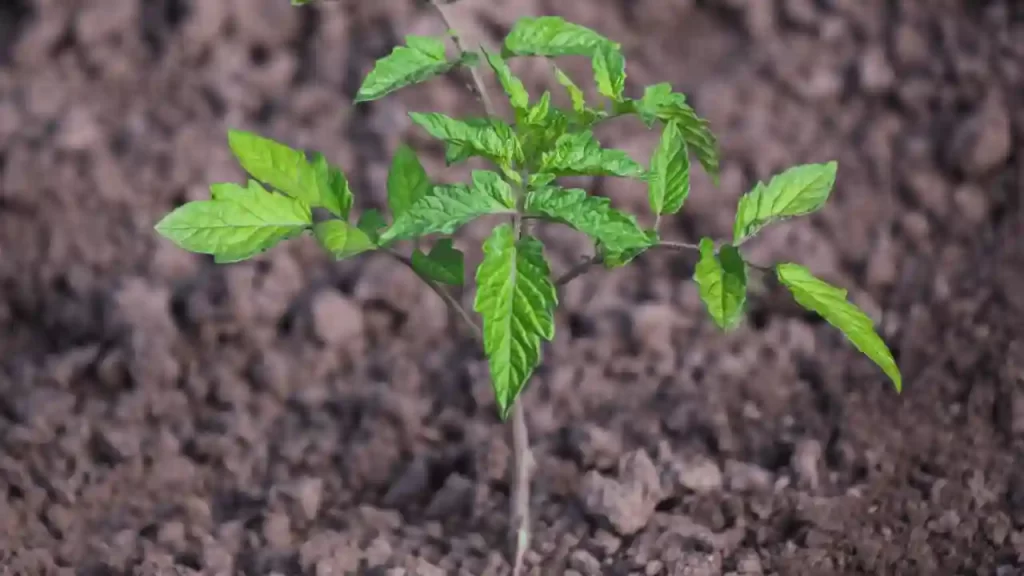
Fungal disease is very common in tomato plants; no gardeners want to face it. Unfortunately, there is no treatment for many fungal diseases, and you must destroy all the infected plants.
But you might have also got suggestions to use coffee grounds for tomato plants to relieve the infections.
Some studies have examined that you can control the fungal disease by applying coffee grounds. But a high amount of caffeine is essential to prevent slugs, and coffee has only 0.1% of caffeine.
This study says that microbial activity of the soil is increased with the application of coffee grounds, and fungal disease due to fusarium wilt is controlled. But it has indicated nothing about other kinds of fungal infections.
Research has indicated that adding spent coffee grounds directly to soil can reduce the growth of plants.
There might be some reality to treat the fungal disease in tomato plants, but it needs confirmation. Thus do not use it to treat the fungal disease in the plant.
Should you use coffee grounds for tomatoes in compost?
The most popular claim is that coffee grounds can be used as compost for tomato plants, and yes, it is right. Coffee grounds can be used as compost.
A correct combination of nitrogen and carbon makes a beneficial compost.
The good compost breaks slowly and supplies the required nutrients to the plant; coffee grounds contain a good amount of nitrogen.
Prepare a compost with 20% coffee mix for safer use, or you must face the unresolvable consequences.
Summary
You can get many suggestions to apply things to your plant for its betterment. But you should always go with logic and scientifically proven methods. The same goes for the application of coffee grounds to your tomato plant. It can help your plant in a few cases only. So apply it in the proven cases only and always ensure to apply it in the right amount.
Take advantage of your used coffee grounds to provide essential nourishment for your tomato plants, but don’t anticipate extravagant results from this single step.
You should avoid its excessive application; otherwise, instead of benefiting your plant, it can ruin it.
